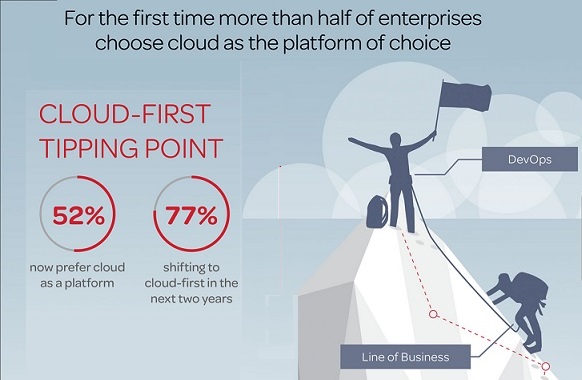Agile software development methods were introduced less than a decade ago, but their popularity has seen a steady rise. However, according to Zephyr's annual How the World Tests report, while a large number of the companies are adopting agile testing methodologies, they face a fair number of obstacles in successful adoption. Here, we’ll cover the key findings of that report and what they mean for those looking to adopt an agile testing process ...
Vendor Forum
Until recently, many IT leaders still believed they could allow their mainframe environments to languish in two-code-drops-a-year waterfall mode, while they embraced DevOps and Agile across their distributed and cloud environments. This so-called "Bimodal lT" strategy has proven to be dangerously flawed. So how do you actually get your mainframe environment up to speed? ...
The task of managing many ongoing technology projects, coupled with the need to continuously amend and improve systems for meeting reporting requirements, sometimes serves as an obstacle for enterprises in implementing Continuous Delivery practices for the database. Yet, enterprises taking advantage of modern, effective DevOps for Database solutions find that it's possible to implement the same Continuous Delivery best practices, which prove valuable in application development, for the database, enabling true database automation that actually mitigates the risk of human error while simultaneously speeding development cycles. The end result is less downtime, fewer errors, and a reduction in development costs ...
Blueprint predicts that application development will become more complex through 2017 as new processes and technologies change the way organizations develop products and engage with markets. As the volume and complexity of development projects grow, enterprises will continue to shift toward Agile and continuous delivery, and new technologies that enable collaboration between stakeholders will be essential. Here are Blueprint's top four predictions for enterprise software development in 2017 ...
What I think we will see in 2017, is an acceleration of the adoption of DevOps, especially within enterprises as the largest enterprise software companies continue developing their DevOps tool set ...
If there's any consistent criticism that's been leveled at the DevOps movement, it's that the term comprises such a wide range of concepts to so many different people, and that it's become more closely associated with marketing than real-world adoption. So how do you overcome such critiques? Obviously the onus is upon those of us working in the space — especially on the provider side — to put a finer point on what DevOps (currently) encompasses in a practical sense. A big part of this must be found in highlighting those real-world use cases where DevOps is having the most significant impact ...
The following are 2017 predictions for DevOps from the executive team at XebiaLabs, covering Analytics, Monitoring, Big Data, Serverless, Container Orchestration and more ...
The following are 2017 predictions for DevOps from the executive team at Electric Cloud, covering Application Release Automation, Microservices and Containers, Continuous Testing, Secure DevOps and more ...
The rapid expansion of production container deployment in enterprises worldwide has led to a movement toward containers-as-a-service (CaaS) over traditional Platform as a Service (PaaS) solutions. Advances in container management tooling are leading operations to embrace CaaS as a solution to enable developers to containerize their legacy applications and then build microservices around them. This trend will rise rapidly in 2017, driven by increased collaboration across IT disciplines and enthusiasm surrounding containerization even at the board level ...
A lot of time, resources and energy has been invested over the past few years on de-siloing development and operations. And with good reason. DevOps is enabling organizations to more aggressively increase their digital agility, while at the same time reducing digital costs and risks. But as 2017 approaches, the hottest trends in DevOps aren’t specifically about dev or ops. They’re about testing, security, and metrics ...
There's nothing stopping many of the biggest enterprise software companies from turning to containers to deliver their software, but the industry is struggling with organic adoption – only 8 percent of enterprise developers are currently using containers for production release. If container technology is so great, why aren't we seeing faster and wider adoption? ...
DevOps still challenges IT organizations particularly when applied to complex, heterogeneous legacy IT. Those systems must be monitored, secured, scaled, load balanced, and configured, a task that can quickly unravel the promise of DevOps. That's because we tend to carry over many of the pre-DevOps manual and time-consuming infrastructure management tasks into the new world order ...
An overwhelming majority of developers (93 percent) indicate that web technologies are critical to their strategy for desktop and mobile, and the demand for new applications and updates to existing applications isn’t going away, according to The State of the Modern Web, a survey of web development professionals ...
When looking at the tools and methodologies used today to manage software development, we see a diverse array. There are traditional waterfall methodologies and tools, agile principles, ALM tools, and increasingly, a DevOps toolchain. The primary objective behind each of these approaches and tools is to manage the development and delivery of software for the enterprise. Software development affects all aspects of operations and is tied more closely to the enterprise than ever before. To truly optimize the development lifecycle and enhance collaboration across the enterprise, we must head toward a new generation of tools aimed at accelerating the pipeline while improving quality ...






